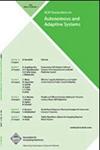A state-dependent time evolving multi-constraint routing algorithm
IF 2.2
4区 计算机科学
Q3 COMPUTER SCIENCE, ARTIFICIAL INTELLIGENCE
ACM Transactions on Autonomous and Adaptive Systems
Pub Date : 2013-04-01
DOI:10.1145/2451248.2451254
引用次数: 3
Abstract
This article proposes a state-dependent routing algorithm based on a global optimization cost function whose parameters are learned from the real-time state of the network with no a priori model. The proposed approach samples, estimates, and builds the model of pertinent and important aspects of the network environment such as type of traffic, QoS policies, resources, etc. It is based on the trial/error paradigm combined with swarm-adaptive approaches. The global system uses a model that combines both a stochastic planned prenavigation for the exploration phase with a deterministic approach for the backward phase. We conducted a performance analysis of the proposed algorithm using OPNET based on several topologies such as the Nippon telephone and telegraph network. The simulation results obtained demonstrate substantial performance improvements over traditional routing approaches as well as the benefits of learning approaches for networks with dynamically changing traffic.一种状态依赖时间演化的多约束路由算法
本文提出了一种基于全局优化代价函数的状态依赖路由算法,该算法的参数从网络的实时状态中学习,没有先验模型。所提出的方法对网络环境的相关和重要方面(如流量类型、QoS策略、资源等)进行采样、估计和构建模型。它是基于试错范式与群体自适应方法的结合。全局系统使用一种模型,该模型结合了勘探阶段的随机计划预导航和逆向阶段的确定性方法。我们使用基于若干拓扑(如Nippon电话和电报网络)的OPNET对所提出的算法进行了性能分析。仿真结果表明,与传统的路由方法相比,该方法的性能有了很大的提高,并且对于流量动态变化的网络,学习方法也有很大的好处。
本文章由计算机程序翻译,如有差异,请以英文原文为准。
求助全文
约1分钟内获得全文
求助全文
来源期刊

ACM Transactions on Autonomous and Adaptive Systems
工程技术-计算机:理论方法
CiteScore
4.80
自引率
7.40%
发文量
9
审稿时长
>12 weeks
期刊介绍:
TAAS addresses research on autonomous and adaptive systems being undertaken by an increasingly interdisciplinary research community -- and provides a common platform under which this work can be published and disseminated. TAAS encourages contributions aimed at supporting the understanding, development, and control of such systems and of their behaviors.
TAAS addresses research on autonomous and adaptive systems being undertaken by an increasingly interdisciplinary research community - and provides a common platform under which this work can be published and disseminated. TAAS encourages contributions aimed at supporting the understanding, development, and control of such systems and of their behaviors. Contributions are expected to be based on sound and innovative theoretical models, algorithms, engineering and programming techniques, infrastructures and systems, or technological and application experiences.
 求助内容:
求助内容: 应助结果提醒方式:
应助结果提醒方式:


